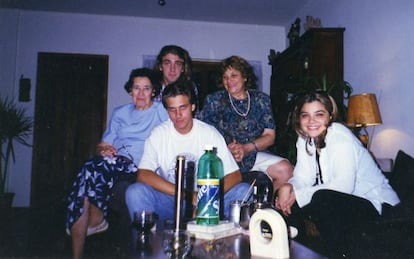The truth was painful but it set me free
Guido’s meeting with the biological family from which he was taken during the Argentinean military dictatorship fills the rest of us recovered grandchildren with hope and strength

Guido’s meeting with his biological family and maternal grandmother, Estela de Carlotto, has stirred up incredible emotions and joy in Argentina and around the world. Now there are 114 of us recovered grandchildren, but an estimated 400 people still do not know their real identity. Guido – or Ignacio as he prefers to be called – is not just another case. He is the grandson of Estela, the president of the Grandmothers of the Plaza de Mayo and so there has been widespread media coverage. Although it invades the intimacy of this family affair, it has also inspired many people who question their own identities to call or visit the Grandmothers.
Guido’s temperance and happiness at his media presentation were good for all of us, but I think it was especially good for him. I couldn’t help identify with much of what he said as I remembered how emotional that experience was for me 20 years ago, when I became grandson number 52. Although he and I have similar backgrounds – both of us were born during our mothers’ stay in prison, both of us were separated from our parents as children – each recovered grandson’s story is unique and we all react differently.
At 17 years old, it was hard for me to process the fact that the people I knew were not in fact my parents”
At 17 years old – I am now 36 – it was hard for me to process the fact that the people I knew were not in fact my parents. I had never doubted it before. That moment marked a definite watershed moment in my life. I suddenly grew up. My biological family had been looking for me all this time. They did not know me and yet they already loved me. We finally met when the DNA test results confirmed that I was the son of Yolanda Casco and Julio D’Elía. I was supposed to be named Martín but, when they asked me to choose, I decided to keep the name Carlos. My parents and their families were from Montevideo and Salto, in Uruguay. They started to come to visit me in Buenos Aires and we met a few times a month. I asked them to go slow and I told them I needed to process what was happening and despite everything that had occurred over the years, they respected my need to do so. We had the same blood but we were not going to have a connection overnight. We had to get to know each other, learn to love each other. The truth is that I needed to start loving them; they had always loved me.
I decided to add all the love – that of my biological family and that of the family that raised me”
I had a very happy childhood and I was raised with a lot of love. The love I felt for the family that raised me was very strong and I did not want to lose them. That they had lied to me for so many years hurt, but I chose to forgive them. I decided to add all the love – that of my biological family and that of the family that raised me. They all understood and made what was good for me, what I wanted, the priority and so I consider myself very lucky. With time, I came to know my parents through their families, through their friends and I learned to love them, to fall in love with them, and to look out for them as they had looked out for me. Finding out what happened was painful but the truth set me free and it allowed me to heal the wounds. The truth always helps you. Today, my wife Inés, my daughters – Sol, Juana, Clara – and I often travel to Uruguay and we all share beautiful family moments. There are many people who love us on both sides of the Plata River.
Guido’s meeting with his biological family renews our hope and fills us with strength in the face of this daily struggle that the Grandmothers of the Plaza de Mayo began alone four decades ago and that, today, is stronger than ever.
Carlos D’Elía Casco is the 52nd grandson recovered by the Grandmothers of the Plaza de Mayo.
Translation: Dyane Jean François
Tu suscripción se está usando en otro dispositivo
¿Quieres añadir otro usuario a tu suscripción?
Si continúas leyendo en este dispositivo, no se podrá leer en el otro.
FlechaTu suscripción se está usando en otro dispositivo y solo puedes acceder a EL PAÍS desde un dispositivo a la vez.
Si quieres compartir tu cuenta, cambia tu suscripción a la modalidad Premium, así podrás añadir otro usuario. Cada uno accederá con su propia cuenta de email, lo que os permitirá personalizar vuestra experiencia en EL PAÍS.
¿Tienes una suscripción de empresa? Accede aquí para contratar más cuentas.
En el caso de no saber quién está usando tu cuenta, te recomendamos cambiar tu contraseña aquí.
Si decides continuar compartiendo tu cuenta, este mensaje se mostrará en tu dispositivo y en el de la otra persona que está usando tu cuenta de forma indefinida, afectando a tu experiencia de lectura. Puedes consultar aquí los términos y condiciones de la suscripción digital.








































